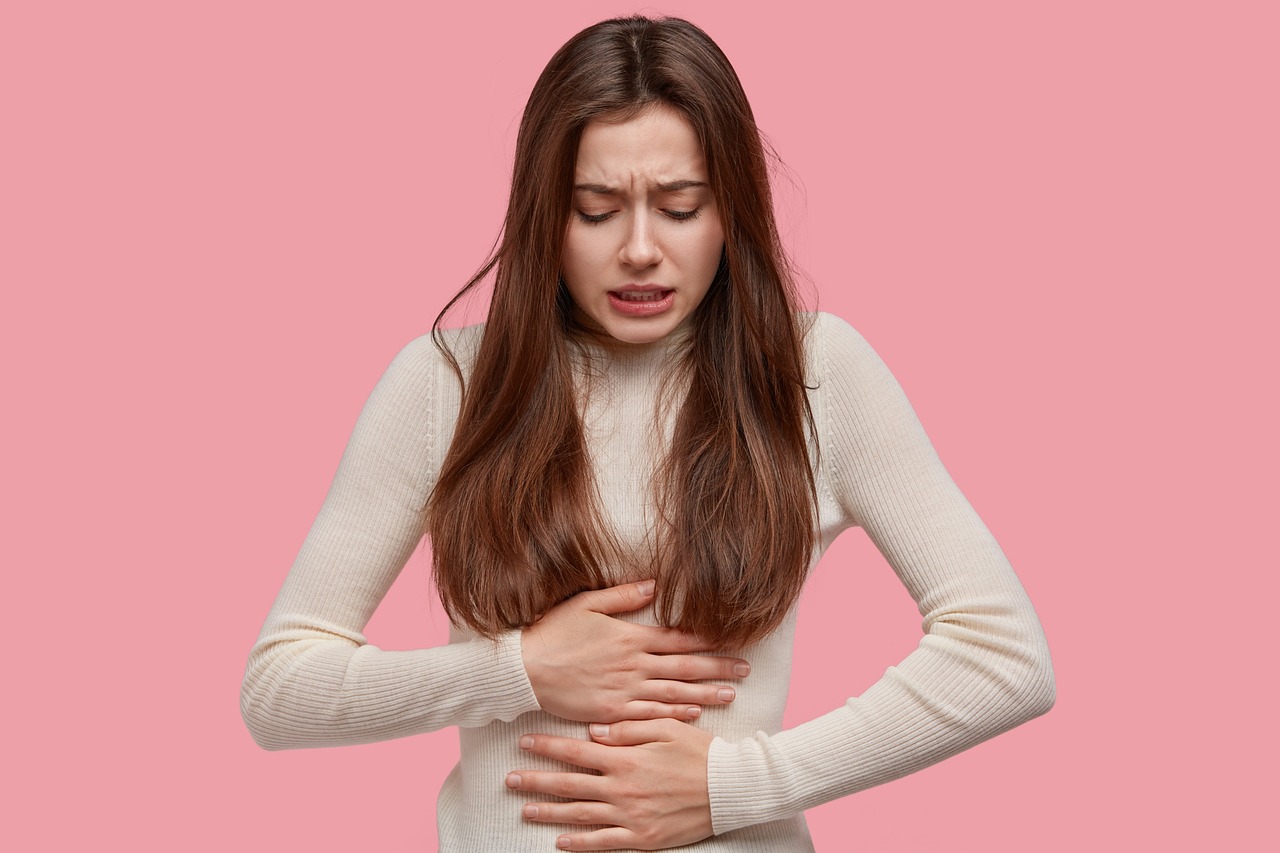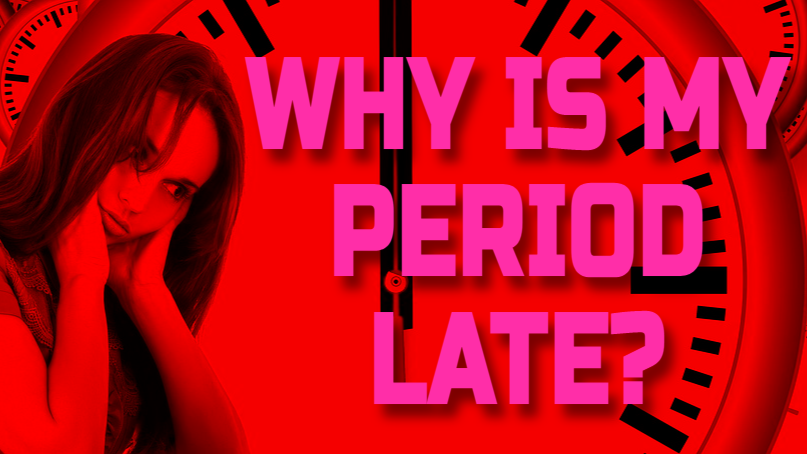Table of Contents
Intro
Having a regular menstrual cycle is an important part of a woman’s overall health and wellbeing, yet many women experience irregular periods. If you are wondering why your period may be late, it could be due to a variety of factors. Hormones, stress levels, diet, exercise and lifestyle can all contribute to changes in the timing of your period. In this article we will look at the various reasons why your period may be late and discuss potential solutions or treatments.

Late Period
Late periods can be a cause of concern for many women. A number of factors can influence the menstrual cycle, including stress, weight gain or loss, medication changes and medical conditions such as polycystic ovary syndrome (PCOS). Pregnancy is also a common reason for a missed or late period. If you have had unprotected sex and your period is late, it's important to take a pregnancy test to rule out the possibility of pregnancy.
If you are not pregnant and your period is still delayed, it's best to consult with your healthcare provider. They may recommend additional testing or refer you to a specialist if necessary. In some cases, medication or lifestyle changes may be recommended to regulate your menstrual cycle.
It's important to keep track of your menstrual cycle and note any changes in length or frequency. This information can help pinpoint any potential issues and allow for earlier intervention if needed.

Causes Why my Period is Late: Stress, Change in Diet, Medications
Stress is one of the most common causes of a delayed period. When you experience stress, your body releases cortisol, which can cause hormonal imbalances that affect your menstrual cycle. Stressful events such as exams, work deadlines or relationship problems can be enough to disrupt your cycle.
Another common cause of a late period is changes in diet. A sudden weight loss or being underweight can also affect your hormones and lead to missed periods. Similarly, a drastic change in diet where you're not getting enough nutrients can also impact your menstrual cycle. This is because the body prioritizes essential functions over non-essential ones such as menstruation.
Certain medications can also cause changes to your menstrual cycle. For example, contraceptive hormonal birth control pills regulate periods by controlling hormone levels; however, if you miss taking them for several days or stop taking them altogether it may result in a delayed period. Other medications that may cause irregular periods include antidepressants and chemotherapy drugs which alter hormone levels in the body leading to irregularities in menstruation patterns.

Diabetes and Thyroid Disease Can be Reasons for a late Period
Diabetes and thyroid disease are both common conditions that can have an impact on your menstrual cycle. Diabetes affects the way your body processes glucose, which can lead to high blood sugar levels and insulin resistance. Thyroid disease, on the other hand, affects the function of your thyroid gland, which plays a role in regulating your metabolism.
Both diabetes and thyroid disease can cause hormonal imbalances in the body, which may result in irregular periods or missed periods altogether. In addition to affecting the frequency of your menstrual cycle, these conditions may also cause changes in the duration or intensity of your period.
If you have been diagnosed with either diabetes or thyroid disease and are experiencing changes to your menstrual cycle, it is important to talk with your healthcare provider about potential treatment options. They may recommend lifestyle changes such as diet and exercise for managing diabetes or medication to regulate thyroid function if necessary. By working closely with a healthcare professional, you can help manage these conditions and minimize their impact on your overall health and well-being.

Polycystic Ovary Syndrome (PCOS)
Polycystic Ovary Syndrome (PCOS) is a common hormonal disorder affecting women of reproductive age. It is characterized by the presence of small cysts on the ovaries, hormonal imbalances, and insulin resistance. One of the most common symptoms of PCOS is irregular menstrual cycles or a complete lack of period. This can be confusing and concerning for many women who may wonder, “Why is my period late?”
The answer lies in the hormonal imbalances that are at the root of PCOS. In PCOS, the ovaries produce more androgens (male hormones) than estrogen and progesterone. These imbalances can prevent ovulation or lead to irregular ovulation, resulting in missed or delayed periods. Additionally, the build-up of cysts on the ovaries can interfere with the production of hormones needed for menstrual regulation.
Thus, PCOS can make it difficult for women to predict when their next period will occur, and can also cause menstrual bleeding to be heavier and more painful than usual. Other symptoms of PCOS include acne, hair loss or growth, weight gain, and difficulty getting pregnant. While there is no cure for PCOS, treatments such as birth control pills, insulin-sensitizing medications, and lifestyle changes can help manage symptoms and improve fertility.
Seeking medical advice is important for women who experience irregular periods or other concerning symptoms, as early diagnosis and treatment can prevent complications such as diabetes, heart disease, and infertility.

Symptoms: Irregular Bleeding, Low Energy
If you've been experiencing irregular bleeding and low energy, it could be a sign that your period is late. Irregular periods can happen due to various reasons such as stress, weight changes, hormonal imbalances, and certain medical conditions. Additionally, if you have missed your period for three or more consecutive months, this may indicate a condition called amenorrhea.
Low energy levels can also be attributed to hormonal imbalances caused by delayed periods. Estrogen and progesterone are hormones responsible for regulating the menstrual cycle. When these hormones are not produced in appropriate amounts or when their balance is disrupted, it can lead to fatigue and low energy levels.
It’s important to speak with your healthcare provider if you experience these symptoms regularly. They will help determine the underlying cause of your symptoms and provide appropriate treatment to regulate your menstrual cycle and boost your energy levels.

Perimenopause
Perimenopause is a natural transition period when the body prepares for menopause. Symptoms such as hot flashes, night sweats, mood swings, and irregular periods are common during this time. It can start as early as in the 30s or 40s and last up to ten years before menopause sets in.
One of the most common symptoms of perimenopause is irregular periods which can cause confusion about whether one's period is late or not. The menstrual cycle during perimenopause may become shorter, longer, heavier, lighter than usual or even stop completely for months at a time. This change occurs due to fluctuations in estrogen levels that affect ovulation and hormone production.
It is important to note that missing a period does not always indicate perimenopause; it could be due to several other factors such as stress, weight changes, medications or underlying medical conditions. However, if you experience consistent irregularities or missed periods along with other symptoms of perimenopause, it's best to consult your healthcare provider for proper diagnosis and treatment options.

Diagnosis & Treatment: Doctor Visit, Hormone Therapy
A late period can be a cause of concern for many women, especially if they have regular menstrual cycles. The first step in diagnosing the reason behind a delayed period is to schedule an appointment with your doctor. During the consultation, your doctor may ask you about your medical history and perform a physical examination to determine the possible causes. They may also recommend further tests such as blood tests or ultrasounds.
If the reason behind your late period is hormonal imbalances or irregularities, hormone therapy may be recommended by your doctor. Hormone therapy involves taking medications that help regulate hormone levels in the body and restore balance. Hormone therapy can come in different forms such as pills, patches, gels, vaginal rings, or injections depending on individual needs and preferences.
It is important to keep in mind that every woman's situation is unique and requires personalized medical attention. It's essential always to consult with a qualified healthcare professional before starting any treatment plan for a late period or any other health issues related to menstruation.

Self Care: Healthy Habits, Support System
If you're wondering why your period is late, it's important to take a step back and assess the potential causes. While pregnancy is often the first assumption, there are many other factors that can contribute to a delayed menstrual cycle. Stress levels, fluctuating hormones, weight changes, certain medications or medical conditions, and even travel can all impact your menstrual cycle.
One way to support your body during this time is through healthy habits such as regular exercise and a balanced diet. Taking care of your mental health through stress-reducing activities like meditation or therapy can also play a role in regulating hormones and preventing delays in periods.
Additionally, having a support system of friends or family members who understand what you're going through can provide emotional support and help alleviate any anxiety or stress caused by an irregular period. Ultimately, taking care of yourself both physically and mentally can help regulate your menstrual cycle and lead to overall better reproductive health.

Prevention: Monitoring Health Habits
If you're wondering why your period is late, it's essential to monitor your health habits. Stress and poor sleep patterns can disrupt the hormonal balance in your body, leading to a delay in menstruation. Thus, tracking the hours of sleep and stress levels daily is crucial.
Moreover, maintaining a healthy diet can also help regulate menstrual cycles. A balanced diet with enough nutrients like iron, calcium, and vitamins ensures that the body has all it needs for proper hormone regulation.
In conclusion, monitoring health habits is crucial in preventing delayed periods. Tracking sleep patterns, managing stress levels and maintaining a healthy diet aids in regulating hormones responsible for menstrual cycles.

Conclusion: Seek Medical Advice
In conclusion, if you're experiencing a late period, it's important to seek medical advice. While occasional irregularities in menstrual cycles are common and nothing to worry about, persistent or sudden changes in your cycle could be an indication of an underlying medical condition. A doctor can help determine the root cause of your missed period and provide appropriate treatment.
Some possible causes of a late period include stress, weight fluctuations, hormonal imbalances, polycystic ovary syndrome (PCOS), thyroid disorders or pregnancy. If you suspect you might be pregnant but have not taken a test yet, it is advisable to visit your doctor as soon as possible for confirmation and guidance on how to proceed.
Ultimately, whether you're trying to conceive or not, it's important to prioritize your reproductive health by seeking professional medical care when necessary.
Related Articles
Health Line Why is my period late?
https://www.healthline.com/health/womens-health/why-is-my-period-late
FFO Why is my period late?Reasons for a delayed period.
https://flo.health/menstrual-cycle/health/period/reasons-for-a-delayed-period
Medical News Today Why is my period late?
https://www.medicalnewstoday.com/articles/318317
Very Well Health Reasons you missed your period
https://www.verywellhealth.com/reasons-you-missed-your-period-2757503
Penn Medical Irregular periods Why is my period late?
Hello Clue Why is my period late?
https://helloclue.com/articles/cycle-a-z/why-is-my-period-late
Livi Why is my period late 7 potential reasons
https://www.livi.co.uk/your-health/why-is-my-period-late-7-potential-reasons/
Boots Why is my period late?
https://www.boots.com/inspiration-advice/health/womens-health-advice/why-is-my-period-late
DR Lenkliman Why is my period late common causes and reasons
https://drlenkliman.com.au/articles/why-is-my-period-late-common-causes-and-reasons/
Lloyds Pharmacy Why is my period late?
https://lloydspharmacy.com/blogs/womens-health/why-is-my-period-late
Imaware Health Why is my period late?
https://www.imaware.health/blog/why-is-my-period-late
Moon Cup Why is my period late?
https://www.mooncup.co.uk/blog/why-is-my-period-late/
Nerd Momma Why do I sweat so much?
https://nerdmomma.com/why-do-i-sweat-so-much-9-powerful-facts/#more-1838
Nerd Momma Why is my eye twitching?
https://nerdmomma.com/why-is-my-eye-twitching-stop-9-eyelid-twitch-facts/#more-1759

So true. A lot of different factors can affect or halt a woman’s menstrual cycle.
It is always good to understand how our body works and what is going on inside our bodies and why.